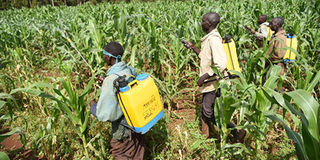Synthetic farm chemicals boost harvest

Pesticide is sprayed on a maize plantation in Turbo, Uasin Gishu County, on June 19, 2018. Various experts have ranted against synthetic pesticides and fertilisers. PHOTO | FILE | NATION MEDIA GROUP
What you need to know:
- Independent science-based regulatory agencies around the world have comprehensively evaluated glyphosate-based herbicides and found them safe to use in accordance with label directions.
- In Kenya, reputable scientists have backed the continued use of glyphosate-based products, insisting that they have no undue health risks, including cancer, to the Kenyan public.
The three-day first International Conference on Agroecology Transforming Agriculture and Food Systems in Africa, held recently at the Safari Park Hotel, Nairobi, attracted more than 500 participants from across the world.
Hosted by the World Food Preservation Centre (WFPC), IFOAM Organics International, Biovision Africa Trust and their local and international partners, its theme was, ostensibly, to promote organic and non-GMO farming in Africa to facilitate establishment of sustainable food and agriculture systems.
Keynote speakers included big names such as Prof Ratemo Michieka from Kenya and the Purdue University duo of Prof Tyrone Hayes and Prof Don Huber.
Organisers touted it as a convention of agriculture experts, scientists, value chain actors, farmers and policymakers from governments and international bodies.
ANTI-SCIENCE
As a commercial farmer, I had hoped to learn more about organic farming, the new buzzword in the agricultural sector. However, I was left rather confused and disappointed.
What was billed as a grand debate on transforming agriculture in Africa turned out to be an anti-science convention.
Save for our very own Prof Michieka, who gave a realistic keynote address that ended with a recommendation to provide farmers with a workable toolbox, the rest of the panel struck me as fringe scientists and conspiracy theorists camouflaging themselves as pro-organic farming activists.
Emboldened by the recent case in the United States, where a Californian jury awarded a couple $2 billion (Sh200 billion) in a verdict against Monsanto on allegations that its weed killer RoundUp caused cancer, speakers took turns ranting against synthetic pesticides and fertilisers.
PESTICIDES
Like doomsday cultists, they declared that the end of the world was nigh unless we all repented and stopped using synthetic chemicals to control weeds and pests and fertilisers. To them, the only way to reach the ‘Promised Land’ is to only practice organic farming.
This is a very dangerous and reckless preposition. As one commentator said, the conference was anti-science activism based on environmental fantasies.
“Agroecology as a political doctrine has no place in science-based policy discourse, and its promotion – given the scientific knowledge we have to today – is immoral. It needs to be stopped,” said Bill Wirtz, a policy analyst.
Most real scientists have declared glyphosate safe for use as a pesticide. There is only one study that concludes that glyphosate may cause cancer, many others don’t.
Using the US jury decision to call for a glyphosate ban is also rather desperate.
The jurists were not scientists, and they did not really have the necessary knowledge about the subject to make a fair verdict. In any case, the US jury system is highly discredited, having jailed many innocent black people on trumped-up charges.
PUBLIC HEALTH
Secondly, independent science-based regulatory agencies around the world have comprehensively evaluated glyphosate-based herbicides and found them safe to use in accordance with label directions.
In its Glyphosate Proposed Interim Decision released in April, the US Environmental Protection Agency said “there are no risks to public health when glyphosate is used in accordance with its current label instructions and that glyphosate is not a carcinogen”.
The EPA also proposed management measures to help farmers target pesticide sprays on intended pests, protect pollinators and reduce the problem of weeds becoming resistant to glyphosate.
In Kenya, reputable scientists have backed the continued use of glyphosate-based products, insisting that they have no undue health risks, including cancer, to the Kenyan public.
“To produce sufficient food for our rapidly growing population and achieve zero hunger and malnutrition, an aspiration of the Sustainable Development Goals (SDG),” said Prof Michieka. “We have no choice but to use pesticides, which should be used safely and responsibly.”
BIG FOUR AGENDA
Prof Michieka, who is the secretary of the Kenya National Academy of Sciences and a former vice-chancellor at Jomo Kenyatta University of Agriculture and Technology, also said use of pesticides will accelerate the actualisation of the ‘Big Four Agenda’, especially on food security and nutrition.
Top scientists who spoke in support of Prof Michieka’s position included Dr Moses Rugutt, the director-general, National Commission for Science, Technology and Innovation, Pest Control Products Board CEO Peter Opiyo and Dr Eric Eshitera of Maasai Mara University.
They all can’t be wrong. We need judicious, sustainable and responsible use of pesticides, not a blanket condemnation or ban.
Mr Ojepat is a farmer and CEO, Fresh Produce Consortium of Kenya. [email protected]




